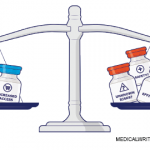(Reuters)—Pfizer Inc said on Wednesday its biosimilar of Roche’s Rituxan was as effective as the original drug in treating patients with a type of follicular lymphoma, meeting the main goal of a study.
The success of Pfizer’s biosimilar comes as Rituxan’s U.S. patent is set to expire later this year. The drug had raked in sales of about 7.30 billion Swiss francs ($7.70 billion) in 2016.
Rituxan, Roche’s best-selling drug, is used in treating several types of blood cancer as well as rheumatoid arthritis.
Increasing competition by biosimilars is expected to erode sales for a number of Roche’s top-selling cancer drugs. The Swiss drugmakers shares were down 0.8% on Thursday.
Rituxan, breast cancer drug Herceptin and Avastin together had 2016 revenue of 20.9 billion Swiss francs ($21.8 billion) – equal to more than half Roche’s pharmaceuticals business. Still, their combined sales are expected to fall more than 40% by 2022, according to consensus analyst forecasts compiled by Thomson Reuters.
The U.S. Food and Drug Administration approved Mylan NV’s biosimilar of Herceptin last month. The FDA and the European Commission have both approved Amgen’s biosimilar version of Avastin.
Roche and Biogen Inc co-market Rituxan in the United States. The drug is sold under the brand name MabThera by Roche in other markets, except Japan where its is co-marketed by Chugai and Zenyaku Kogyo Co Ltd.
Rituxan first received the U.S. Food and Drug Administration’s approval in 1997 to treat a type of blood cancer.
Pfizer’s shares were up marginally in late morning trading on Wednesday.

